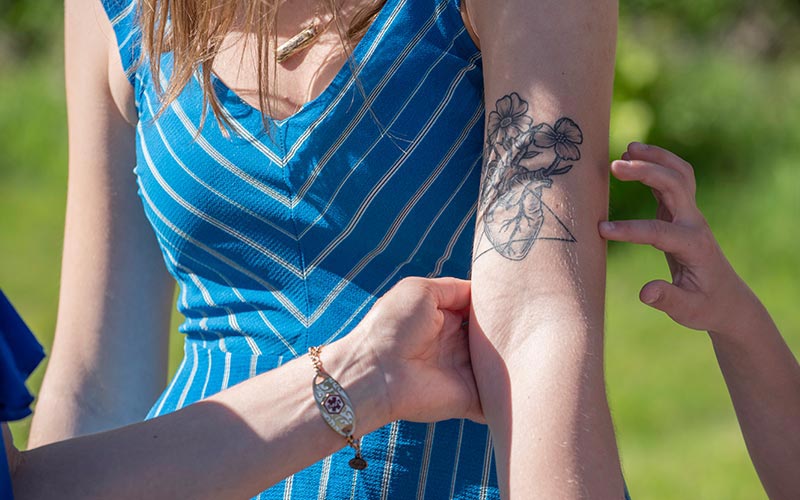Karen Glugla: SCAD Patient
 Rare heart condition is number one cause of heart attacks in women under 50
Rare heart condition is number one cause of heart attacks in women under 50
Karen Glugla, 46, is a Macomb Township mother of four. She eats a balanced diet, works out and maintains a healthy weight. In 2018, she had her second heart attack.
“Both times, (2014 and 2018) doctors in the ER ran past me in the hallway and questioned if they had the right patient because I didn’t look like someone who would have that sort of EKG,” said Karen.
What is SCAD?
After her second heart attack in 2018, Karen was diagnosed with SCAD (spontaneous coronary artery dissection) by Nikhil Ambulgekar, M.D., an interventional cardiologist at Henry Ford Macomb Hospital, when a coronary angiogram revealed a tapered/narrow artery of concern with no disease elsewhere.
SCAD is a lesser known condition that has only been researched in the past decade. While it causes only a small percent of heart attacks overall, it is the number one cause of heart attacks in women under age 50, pregnant women and new moms. It can, however, affect any age and men too.
Unlike a typical heart attack caused by a rupture of plaque in the arteries, a SCAD heart attack starts with a tear in the wall of an otherwise normal coronary artery. The effects of the tear can block the artery and blood flow to the heart muscles, leading to a potentially fatal heart attack.
“SCAD heart attacks mimic STEMI heart attacks (ST Segment Elevation Myocardial Infarction) in females. They present with typical chest pain and EKG findings, but their coronary anatomy may not display flow-limiting lesions requiring intervention. SCAD needs to be considered in relatively healthy women who experience severe chest pain with EKG findings,” said Dr. Ambulgaker.
SCAD symptoms and treatment
During her first SCAD heart attack in 2014, Karen recalls feeling an adrenaline rush, followed by a crushing feeling in her chest and difficulty breathing, which she initially thought was an anxiety attack related to a highly stressful personal event. Soon, she had pain shooting through her jaw and down her left arm as she broke out in a cold sweat. Her daughter called 911.
“I started to pray as I heard the sirens getting closer. It felt more like begging, ‘Please hurry. I can’t die in my house in front of my children,’” recalls Karen.
In 2018, Karen was at home recovering from an unrelated surgery when her second SCAD event hit. Without warning, she felt weakness, followed by a heavy weight on her chest and then, severe chest pain. She began to sweat profusely. Her husband called 911.
“I hugged my 9-year-old daughter the best I could and told her everything would be fine. She didn’t believe me. She started to cry and went to hide in her room,” Karen remembers.
Treatment for SCAD may differ from standard heart attacks. While stents are often used to open a blocked artery, a stent can extend the tear in the artery of a SCAD patient. Karen recovered from both of her SCAD events with medical therapy.
Dr. Ambulgekar advised that patients who are diagnosed with SCAD should avoid stressors, control blood pressure and be evaluated for fibromuscular dysplasia (FMD), an uncommon vascular disease, to help prevent future episodes.
“I am forever grateful to Dr. Ambulgekar for being on alert for this type of heart disease. He is the reason I am getting answers and the appropriate follow up care,” said Karen.
Raising SCAD awareness
Karen’s children have joined her in her crusade to spread the word about SCAD. Her oldest daughter designed a tattoo on her arm of a human heart with flowers growing from it in her mom’s honor. Her youngest chose her mom as her hero for a class writing assignment. In 2022, the entire family helped to organize Michigan's first SCADaddle for Research 5K.
By sharing her story, she hopes to raise awareness of SCAD and money for research.
While she was “fortunate” that her symptoms were that of a typical heart attack, women often have more subtle symptoms, which are sometimes dismissed as anxiety, gas, indigestion or something else because of their age, gender and otherwise good health.
“Please don't put off seeking medical attention if you have any symptoms of a heart attack,” Karen advised. “Ask questions and even ask about SCAD. Anyone can have a heart attack. There is never a reason to be ashamed or embarrassed. You could save your own life, or someone else’s.”
.svg?iar=0&hash=F6049510E33E4E6D8196C26CCC0A64A4)

/hfh-logo-main--white.svg?iar=0&hash=ED491CBFADFB7670FAE94559C98D7798)





